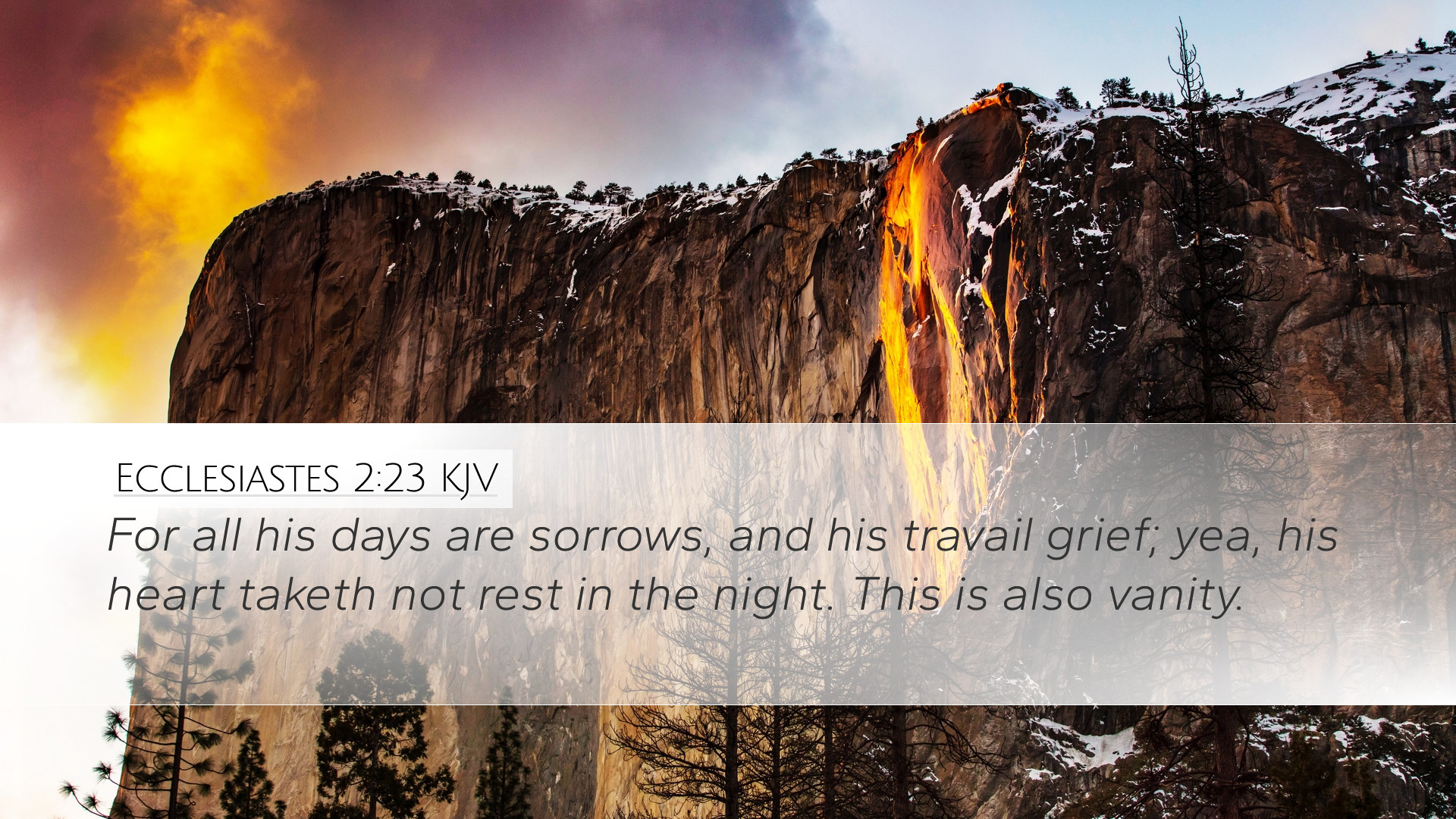Ecclesiastes 2:23 Commentary
Verse: "For all his days are sorrows, and his travail grief; yea, his heart taketh not rest in the night. This is also vanity." (Ecclesiastes 2:23)
Introduction
The book of Ecclesiastes presents a profound exploration of the meaning of life, especially the pursuits of pleasure, toil, and wisdom. In this specific verse, the author encapsulates the futility of labor under the sun, emphasizing the burdens that accompany earthly endeavors.
Matthew Henry's Insight
Matthew Henry articulates that the toil of man is accompanied by sorrow and grief, suggesting that earthly pursuits often lead to dissatisfaction and distress. He notes that even in the midst of labor, the heart finds no peace, which can be interpreted as the universal human condition. This relentless struggle for meaning often leaves individuals feeling empty and chasing after wind.
- Sorrowful Existence: Henry points out that sorrow is an integral part of human existence, particularly for those who engage deeply in the toil of life.
- No Rest: The relentless nature of work results in sleepless nights, which might symbolize an inner turmoil and a quest for meaning that remains unfulfilled.
- Vanity of Life: Ultimately, Henry emphasizes that all such struggles are vanity, leading to a life devoid of true satisfaction or joy.
Albert Barnes' Perspective
Albert Barnes offers a complementary perspective, focusing on the recurring theme of vanity in Ecclesiastes. He reflects on the idea that life's pursuits, particularly through labor, often yield no lasting substance or joy.
- Days of Sorrow: Barnes interprets the "days of sorrow" as a depiction of the burdens that come with labor and the inevitable weariness that follows.
- The Grief of Travail: He suggests that while physical labor aims to achieve some form of benefit, it often culminates in grief rather than reward, highlighting the paradox of human effort.
- Restlessness: Barnes emphasizes that the neglect of spiritual fulfillment leads to a restless heart, pointing readers toward the necessity of seeking God amidst life's challenges.
Adam Clarke's Analysis
Adam Clarke delves into the psychological and emotional aspects of toil, offering a nuanced view of how earthly labor impacts one’s psyche. He agrees with his predecessors on the futility of seeking fulfillment purely through worldly efforts.
- Nature of Human Work: Clarke discusses how human work is filled with turmoil and dissatisfaction, proposing that it reflects the fallen state of humanity.
- The Pursuit of Knowledge: He notes that the pursuit of wisdom and knowledge can also lead to grief, suggesting that understanding the world can bring more questions than answers.
- Rest and Reflection: Clarke highlights the importance of rest and reflection in alleviating the burdens of toil. He advises cultivating a deeper relationship with God to offset the weariness of life.
Theological Implications
From a theological standpoint, Ecclesiastes 2:23 prompts reflection on the nature of human existence. It poses critical questions regarding the purpose of life and the role of divine providence. The struggle of the human heart against the backdrop of fleeting joys is a reminder that true fulfillment is found not in earthly endeavors but in a relationship with the Creator.
- The Burden of Sin: The sorrows associated with toil can be seen as a consequence of sin, serving as a reminder of humanity’s need for redemption.
- Hope in Christ: For believers, the understanding that through Christ one can find rest and meaning amidst the chaos of life transforms the perspective on labor.
- Call to Spiritual Labor: The passage invites a consideration of the labor that yields eternal fruits rather than temporal gains, underscoring the value of spiritual investments.
Conclusion
Ecclesiastes 2:23 serves as a sobering reminder that earthly pursuits are often fraught with sorrow and restlessness. Both Matthew Henry, Albert Barnes, and Adam Clarke resonate with this theme, urging readers to seek solace in God amidst life’s uncertainties. This passage challenges pastors, students, theologians, and scholars to reflect on the deeper significance of their labors and to redirect their aspirations towards eternal, godly pursuits.


